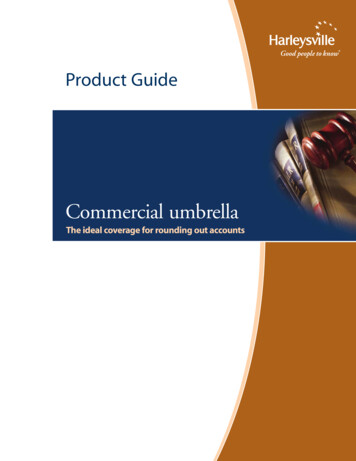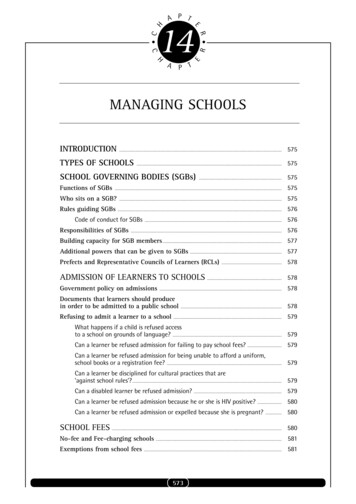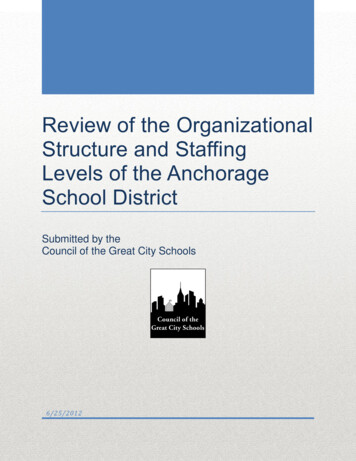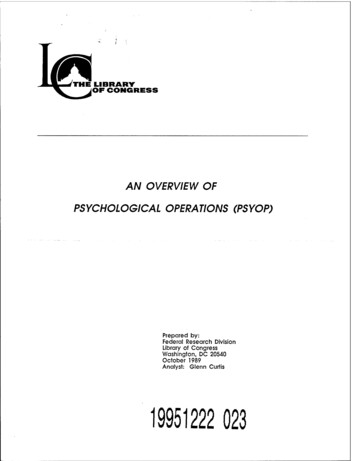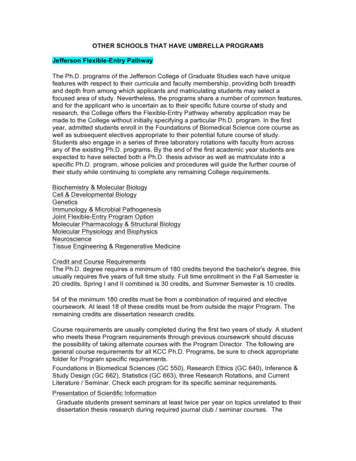
Transcription
OTHER SCHOOLS THAT HAVE UMBRELLA PROGRAMSJefferson Flexible-Entry PathwayThe Ph.D. programs of the Jefferson College of Graduate Studies each have uniquefeatures with respect to their curricula and faculty membership, providing both breadthand depth from among which applicants and matriculating students may select afocused area of study. Nevertheless, the programs share a number of common features,and for the applicant who is uncertain as to their specific future course of study andresearch, the College offers the Flexible-Entry Pathway whereby application may bemade to the College without initially specifying a particular Ph.D. program. In the firstyear, admitted students enroll in the Foundations of Biomedical Science core course aswell as subsequent electives appropriate to their potential future course of study.Students also engage in a series of three laboratory rotations with faculty from acrossany of the existing Ph.D. programs. By the end of the first academic year students areexpected to have selected both a Ph.D. thesis advisor as well as matriculate into aspecific Ph.D. program, whose policies and procedures will guide the further course oftheir study while continuing to complete any remaining College requirements.Biochemistry & Molecular BiologyCell & Developmental BiologyGeneticsImmunology & Microbial PathogenesisJoint Flexible-Entry Program OptionMolecular Pharmacology & Structural BiologyMolecular Physiology and BiophysicsNeuroscienceTissue Engineering & Regenerative MedicineCredit and Course RequirementsThe Ph.D. degree requires a minimum of 180 credits beyond the bachelor's degree, thisusually requires five years of full time study. Full time enrollment in the Fall Semester is20 credits, Spring I and II combined is 30 credits, and Summer Semester is 10 credits.54 of the minimum 180 credits must be from a combination of required and electivecoursework. At least 18 of these credits must be from outside the major Program. Theremaining credits are dissertation research credits.Course requirements are usually completed during the first two years of study. A studentwho meets these Program requirements through previous coursework should discussthe possibility of taking alternate courses with the Program Director. The following aregeneral course requirements for all KCC Ph.D. Programs, be sure to check appropriatefolder for Program specific requirements.Foundations in Biomedical Sciences (GC 550), Research Ethics (GC 640), Inference &Study Design (GC 662), Statistics (GC 663), three Research Rotations, and CurrentLiterature / Seminar. Check each program for its specific seminar requirements.Presentation of Scientific InformationGraduate students present seminars at least twice per year on topics unrelated to theirdissertation thesis research during required journal club / seminar courses. The
purpose of this is to develop the ability to communicate scientific information, todevelop skills for answering questions in a public forum and to provide training in thecritical evaluation of scientific data. Students select a research article from a currentjournal with the approval of their faculty advisor and a strategy is formulated for thepresentation of the article. The student is required to present sufficient backgroundinformation on the topic of the article, as well as a critique of the scientific informationcontained in the article in the seminar presentation.Beginning in their fourth year of enrollment, each student will present his/her progressonce a year in the "Research in Progress" Seminar series that occurs on a weeklybasis and in which pre- and postdoctoral trainees participate. All students are expectedto regularly attend the Research in Progress Seminar Series.GC 550 Foundations of Biomedical SciencesCredits 10FallThis course is designed to provide a basic knowledge of biochemistry, genetics,molecular biology andcellular biology to the beginning student. The primary goal is to convey knowledge of themolecular andcellular mechanisms controlling cell, tissue and organ system function using materialdrawn frombiochemistry, cell biology, genetics, pharmacology and physiology. The course willfamiliarize the studentwith the powerful technologies used in scientific research and will train the student in thecommunication ofscience through informal sessions on evaluation of published literature, scientific writing,oral presentations,and information retrieval.Medical College of Wisconsin Interdisciplinary Programs in Biomedical Sciences··············Bacterial PathogenesisCancer BiologyCardiovascular BiologyCell BiologyCellular and Molecular NeuroscienceDevelopmental BiologyEnzymology and MetabolismFree Radical BiologyImmunologyMolecular GeneticsMolecular PharmacologySignaling and Gene ExpressionStructural BiologyVirologyDuring the first two semesters, Ph.D. trainees participate in a core curriculum thatintegrates molecular, cellular, genetic, and biochemical material. Courses include
lectures, problem solving, and discussion sessions that focus on current researchproblems. Through faculty member interaction and laboratory rotations, students select adissertation advisor from the large and diverse graduate faculty and, at the end of 18months, matriculate into one department for advanced training. Advancement to Ph.D.candidacy occurs after successful completion of a qualifying examination andacceptance of a research plan.University of Buffalo Interdisciplinary Graduate Program in Biomedical Sciences1st Semester Cell Biology IPrinciples of BiochemistryLaboratory Rotation IFundamentals in Biomedical Sciences - Informatics and Literature2nd Semester Laboratory Rotation IILaboratory Rotation IIIFundamentals in Biomedical Sciences - Techniques and ApproachesElectivesYou will take two electives in your second semester:Biochemistry BCH 507 Protein Structure and FunctionBCH 508 Gene ExpressionBCH 512 Developmental GenomicsBCH 519 Bioinformatics and Computational BiologyBCH 522 Protein-Nucleic Acid InteractionBCH 607 DNA Replication and RepairBiophysics BPH 505 Biophysical Basics: ProcessesMicrobiology and Immunology MIC 512 Fundamentals of ImmunologyMIC 522 Protein-Nucleic Acid InteractionNeuroscience NRS 520 Neuroscience INRS 524 Neuroscience III
Oral Biology ORB 531 Oral ImmunologyPharmacology PMY 512 Principles of PharmacologyPMY 516 Mechanism of Drug ActionPMY 527 Translational PharmacologyPhysiology PGY 505 Cell and Membrane PhysiologyPGY 607 Cellular and Molecular Basis of DiseaseStructural Biology STB 531 Protein Production, Purification and CrystallizationBMS 501, CELL BIOLOGY IFall 2010DATE TOPIC INSTRUCTORThe Membrane and Cell Architecture8/30 Compartmentalization, lipid structure, and basic principles Fliesler9/1 Historical perspectives: “Fluid mosaic” model and beyond Fliesler9/3 Membrane molecular dynamics, higher-order structure,and isolation/characterization of membrane fractions Fliesler9/6 No class: Labor Day9/8 Conference Fliesler9/10 The cytoskeleton Hofmann9/13 Cell junctions in polarized tissues Hofmann9/15 Conference Hofmann9/17 Exam IMembrane Transport and Maintenance of Cell Homeostasis9/20 Membrane potential and cell homeostasis Duffey9/22 Membrane ion channels Duffey9/24 The action potential Duffey9/27 Conference Duffey9/29 Facilitated diffusion and active transport Duffey10/1 Transport across polarized tissues Duffey10/4 Conference Duffey10/6 Exam IIDirecting Protein Traffic to Determine Cell Asymmetry and Phenotype10/8 Intracellular compartments and protein sorting Kosman10/11 Intracellular compartments and protein sorting Jacobs10/13 Protein maturation and vesicular trafficking Jacobs10/15 Conference Jacobs 4
10/18 Exo- and Endocytosis Jacobs10/20 Establishing cell polarity Duffey10/22 Secretion in prokaryotes Hakansson10/25 Conference Duffey10/27 Exam IIICommunication between Cells by Extracellular Signals10/29 Signaling through G-protein coupled receptors Rabin11/1 Intracellular modulators: cAMP, calcium and NO Rabin11/3 Signaling through enzyme-coupled receptors Rabin11/5 Conference Rabin11/8 Signaling in epithelial tissues Duffey11/10 Signaling in prokaryotes I Connell11/12 Signaling in prokaryotes II Connell11/15 Conference Connell11/17 Exam IVCellular Genetics, Growth and Differentiation11/19 Cell cycle I Surtees11/22 Cell cycle II Surtees11/24 No class: Thanksgiving11/26 No class: Thanksgiving11/29 Cell cycle checkpoints to cell damage Surtees12/1 Conference Surtees12/3 Proliferation and differentiation in the crypt-villus axis Garrett- Sinha12/6 Transformation of a basal layer cell into a keratinocyte Garrett- Sinha12/8 Adhesion, migration and metastasis of keratinocytes Garrett- Sinha12/10 Conference Garrett- SinhaTBA (Exam week) Exam VBMS503 – PRINCIPLES OF BIOCHEMISTRY – FALL, 2010 LECTURE: MON/WED/FRI, 9-10:15 AM RECITATION: MONDAY OR FRIDAY, 2-3:30 PM FARBER 134B EXAMS WILL BE HELD ON THE DATES IN THE SCHEDULE BELOW ALL EXAMS ARE HELD IN FARBER 144 FROM 2:00-3:30 PART I – Protein Structure and Function D. Kosman (DK) – 653 BRB (2842) camkos@buffalo.edu (Course Coordinator) PART II – Metabolic Pathways G. Popescu (GP) – 647 BRB (3807) popescu@buffalo.edu M. Patel (MP) – 513 BRB (3074) mspatel@buffalo.edu PART III – Nucleic Acid Structure and Function M. Sutton (MS) – 651 BRB (3581) mdsutton@buffalo.edu S. Sinha (SS) – B3-305 COE (881-7994) ssinha2@buffalo.edu L. Read (LR) – 249 BRB (3307) lread@buffalo.edu RECOMMENDED TEXT: BIOCHEMISTRY, 3rd Ed., Mathews, van Holde andAhern. CLASS MEETINGS Part I – Protein structure and function (DK) August 30 Chemical and physical properties of amino acids, proteins and water September 1 cont.
3 Protein structure and stability8 cont.WEDNESDAY RECITATION10 cont.FRIDAY AFTERNOON RECITATION13 Enzyme kinetics and catalysisMONDAY AFTERNOON QUIZ15 cont.17 cont.20 cont. RECITATION22 Kinetics as a probe of mechanism24 Mechanisms of catalysisFRIDAY AFTERNOON RECITATIONPart II – Metabolic pathways27 Metabolic circuitry (GP)EXAM I, SEPT. 27 IN PM (through 9/24)29 Glucose transport and metabolism (GP)October1 Pyruvate metabolism (GP)4 The TCA cycle (GP) RECITATION (GP)6 Electron flow and Ox-Phos (GP)8 Glycogen metabolism (GP)11 Gluconeogenesis, Pentose Shunt (GP) RECITATION (GP)13 Fatty acid catabolism (GP)15 Fatty acid synthesis (GP)EXAM II, OCT. 15 IN PM (through 10/11)18 Amino acid metabolism (MP)RECITATION (GP)20 The urea cycle (MP)22 Integration of metabolism: The fed state (MP)25 Integration of metabolism: The fasted state (MP)RECITATION (MP)PART III – Nucleic acid structure and function27 Structure of nucleic acids (MS)29 Physical properties of nucleic acids (MS)EXAM III, Oct. 29 IN PM (through 10/25)
November1 DNA replication and repair (MS) RECITATION3 cont. (MS)5 cont.(MS)8 cont. (MS) RECITATION (MS)10 Transcription and its control (SS)12 cont. (SS)EXAM IV, NOV. 12 IN PM (through 11/8)15 cont. (SS) RECITATION17 cont. (SS)19 cont. (SS)22 Transcription and development (SS)29 cont. (SS) RECITATION (SS)December1 RNA processing (LR)3 cont (LR)6 Translation (LR) RECITATION (LR)8 cont. (LR)10 Regulation at the level of RNA (LR)RECITATION SCHEDULED BEFOREEXAM V (LR)EXAM V: WEDNESDAY, DEC. 15 (THROUGH 12/10, NOT CUMULATIVE)FARBER 144Exam Format and Policies: All of the exams are CLOSED BOOK. The formatwill be short-answer, in some cases ‘fill in the blanks’. They will be written to becompleted in 60 min with 30 min extra time given for students to go through theiranswers. The six exams will contribute equally to the final grade total.BMS 511: Informatics and literatureFall 2010 9:00-10:20 (unless otherwise noted) Coordinator: Laurie Read2 creditsThe goal of this course is to introduce students to strategies for identifying,generating, reading, and presenting scientific literature. DateTopicInstructor8/31Hall(1st half of students)Instruction RoomPubMedHendrix9/2Hall(2nd half of students)Instruction RoomPubMedLocation AbbottMediaHendrixAbbottMedia
9/7Hall(1st half of students)Instruction RoomWeb of Science9/9Hall(2nd half of students)Instruction RoomWeb of Science9/14Hall(1st half of students)Instruction RoomEndNote9/16Hall(2nd half of students)Instruction RoomEndNote9/23Note: 3 hours (9-noon)Capen HallBLAST9/28CampusNote: 3 hours (9-noon)Capen HallBLAST ediaHendrixAbbottMediaHendrixAbbottMediaReinNorth Campus212ReinNorth212Adapting internet material to Kosman134B Farberpowerpoint presentations10/7HallAdapting internet material to Kosman134B Farberpowerpoint presentations(cont’d)10/9-12/10Student journal clubsInstructors, time, and rooms TBABMS 512, Spring 2011 (2 cr.)Fundamentals of Biomedical Research: Techniques and ApproachesSyllabusMonday/Wednesday, 9:00 – 9:50 Farber 134B Class Schedule: Date Day Topic Instructor1/19/2011 Wed Overview of the SMBS Confocal Microscopy & Flow
Cytometry Core FacilitySigurdson &Kelleher1/24 Mon Bioinformatics Campagnari1/26 Wed Bioinformatics Campagnari1/31 Mon Molecular Biology: Cloning Sutton2/2 Wed Molecular Biology: Recombination Sutton2/7 Mon Molecular Biology: Screens & Selections Connell2/9 Wed Molecular Biology: Screens & Selections Connell2/14 Mon Protein Expression & Protein Purification Gulick2/16 Wed Protein Expression & Protein Purification Gulick2/21 Mon Structural Biology & Protein Crystallography Gulick2/23 Wed Structural Biology & Protein Crystallography Gulick2/28 Mon Arrays, Nucleotide Sequencing, & Genomics Buck3/2 Wed Arrays, Nucleotide Sequencing, & Genomics Buck3/7 Mon Introduction to Model Systems & Eukaryotic Genetics Gronostajski3/9 Wed Model Systems & Genetics: Yeast Panepinto3/14–18 Spring Break, no classes3/21 Mon Model Systems & Genetics: Yeast Panepinto3/23 Wed Model Systems & Genetics: C. elegans Gronostajski3/28 Mon Model Systems & Genetics: C. elegans Gronostajski3/30 Wed Model Systems & Genetics: Mouse Sim4/4 Mon Model Systems & Genetics: Mouse Sim4/6 Wed Model Systems & Genetics: Drosophila Halfon4/11 Mon Model Systems & Genetics: Drosophila Halfon4/13 Wed Model Systems & Genetics: Human O’Brian4/18 Mon Model Systems & Genetics: Human O’Brian4/20 Wed Introduction to Cell Biology Surtees4/25 Mon Protein Trafficking & Protein‐Protein Interactions Surtees4/27 Wed Protein Trafficking & Protein‐Protein Interactions Surtees5/2 Mon Introduction to Translational Research MurphyYale Biological and Biomedical SciencesEight interest-based "Tracks"Within BBS, there are approximately 290 participating faculty, several dozen courses,and countless seminars from which to choose. BBS is divided into eight tional Biology and BioinformaticsImmunologyMicrobiologyMolecular Biophysics and BiochemistryMolecular Cell Biology, Genetics and DevelopmentNeurosciencePharmacological Sciences and Molecular MedicinePhysiology and Integrative Medical Biology What is BBS?
How Does BBS Work?NewsB Magazineo Submit to B Find a PhysicianCalendarContact UsMaps & DirectionsYale PhonebookYSM HomeHow Does BBS Work?Students apply to, and upon matriculation, affiliate with one of these eight Tracks. It isimportant to note that regardless of a student’s home Track, all courses, faculty andresearch opportunities at the university remain available.Year 1 - Each Track has a faculty Director who helps first-year students select coursesand find suitable lab rotations. Students will typically take two to three courses persemester and will conduct two to four lab rotations over the course of the year.Year 2 – Just prior to the start of the second year, students select a thesis adviser inwhose lab they will conduct their doctoral research. They also then leave their BBSTrack and formally join one of 12 Ph.D.-granting programs: Cell BiologyCellular and Molecular PhysiologyComputational Biology and BioinformaticsExperimental PathologyGeneticsImmunobiologyInterdepartmental Neuroscience ProgramMicrobiologyMolecular Biophysics and BiochemistryMolecular, Cellular, and Developmental BiologyNeurobiologyPharmacologyStudents in Year 2 complete the course requirements for the graduate program theyhave joined, take a qualifying exam, act as teaching assistants in lecture or lab courses,and begin thesis research.Year 3 and Beyond – Students focus primarily on thesis research, publishing theirresults, and presenting their work at scientific meetings.Students’ curricula are tailored to meet their individual backgrounds and interests whileat the same time providing essential Track-specific training. Most Tracks haverecommended or required courses, but students can choose electives that are outside ofthese recommendations. It is quite normal to find students from many different Tracks
sitting side-by-side in the same classes. BBS provides an extensive menu of graduatecourses covering the full spectrum of research disciplines, and you can downloaddescriptions of our most recent course offerings here.UMASS Indisciplinary Graduate Program a streamlined and flexible graduate curriculum tailored to the specific needs ofindividual students;participation from more than 130 UMMS labs; andencouragement of students’ rapid initiation into full-time thesis research.The Interdisciplinary Graduate Program (IGP) was established to supportinterdisciplinary approaches to graduate training in biomedical research. The more than130 laboratories that participate in the program are directed by a distinguished group offaculty affiliated with 13 basic science and clinical departments at the Medical School.Program investigators employ a wide range of instrumentation and experimentalapproaches to their research including: classical and molecular genetics; proteomics andgenomics; X-ray crystallography and nuclear magnetic resonance; and digital imagingand laser confocal microscopy of single cells and tissues. Specialized core facilities ingene chip analysis, mass spectroscopy, transgenics, DNA sequencing, analyticalultracentrifugation and biomedical imaging enhance the research capabilities ofindividual labs.Characterized by a streamlined and flexible graduate curriculum that is tailored to thespecific needs of individual students, the IGP encourages rapid initiation of full-timethesis research. A weekly seminar series, sponsored by the Program in MolecularMedicine, features distinguished lecturers from around the world. IGP students also hostone or two of these seminars each semester, and faculty, students and postdoctoralfellows participate in weekly journal clubs and research forums.Program RequirementsThe IGP curriculum allows students the opportunity to become fully engaged in thesisresearch as early as the end of their first year. Students are encouraged to perform twolaboratory rotations per semester in order to ensure that they are exposed to a variety ofexperimental approaches and laboratory environments. Optimally, rotations will becompleted and a thesis laboratory selected by the summer of a student’s first year.Advanced coursework, journal clubs and other enrichment activities beyond thegraduate core course are tailored to the requirements of each student and aredetermined after discussion between the faculty advisor and student. In general, aminimum of two Advanced Topics courses are required.Core CoursesAll first year Basic & Biomedical Science (BBS) students engage in a Core Curriculumthat provides foundational material for advanced graduate study and research in each ofour 8 BBS programs of specialization. The Core Curriculum was founded on the premisethat exposure to and immersion in an intensive course that surveys and debates
contemporary topics in biochemistry, molecular genetics and cell biology prepares ourstudents for the rigors of advanced biomedical research.Biomedical Sciences Block IBlock I covers the biophysics of molecular interactions from thermodynamics throughkinetics and examines the structures of water-soluble proteins, membranes, membranespanning proteins and nucleic acids.Catalog Number: BBS611Biomedical Sciences Block IIBlock II covers DNA replication, recombination and transcription, RNA processing,stability and translation, micro RNAs and RNAi, protein synthesis and degradation andgenetic systems from bacteria through mice.Catalog Number: BBS612Biomedical Sciences Block IIIBlock III addresses cell structure and the flow of information and material betweencompartments and between the cell and its environment.Catalog Number: BBS613Reading, Analysis and Problem SolvingEach Biomedical Science Block includes lectures with exam-based evaluations and“Reading, Analysis and Problem Solving” (RAPS) sessions, which reinforce and expandon the principles described in lectures.Catalog Numbers: BBS611R, BBS612R, BBS613RResponsible Conduct in ResearchRequired of all students, this course provides participants the opportunity to exploresome of the ethical, legal and societal issues involved in the responsible conduct ofscientific research in the 21st century. Sessions will include discussions of cases and/orexercises of institutional and national policies, and short presentations by faculty,administrators, postdoctoral fellows and students.Catalog Number: BBS601Laboratory RotationStudents are required to participate in at least three laboratory rotations during their firstyear in the program. They are intended to familiarize the students with the principles ofscientific inquiry and the concepts and techniques of several scientific fields. They allowfaculty members to observe and evaluate the research aptitudes of students and permitstudents to evaluate the types of projects that might be developed in to dissertationprojects.Catalog Numbers: BBS850, BBS851
Scientific WritingRequired for all students, this course instructs students in the skills of developingscientific research proposals.Catalog Number: BBS602Doctoral Studies Timelines for Students of the Basic & Biomedical SciencesDivision
SpecializationUpon completion of the core curriculum, students request acceptance by a GSBSprogram to pursue advanced course work and thesis research. Students may enter theprogram with a program of specialization in mind (biochemistry & molecularpharmacology, biomedical engineering & medical physics, cell biology, cellular &molecular physiology, immunology & virology, interdisciplinary graduateprogram, molecular genetics & microbiology and neuroscience), or make thatdecision before completion of the core curriculum. Advanced courses offered by theprograms, interdisciplinary courses, laboratory rotations and courses available throughthe Colleges of Worcester Consortium can be applied to the requirements forspecialization. Opportunities are also available for students to participate in grandrounds, clinical seminars and conferences and clinical science research programs.Qualifying ExamPrior to initiating formal doctoral thesis research and no later than the start of their thirdyear, students are required to pass a qualifying examination. This examination is adefense of an original research proposal made before a committee representative of thearea of specialization. The examination is used to evaluate the ability of students to posemeaningful scientific questions, to propose experimental methods for answering thosequestions, and to interpret the validity and significance of probable outcomes of theseexperiments. Some programs also require students to pass a comprehensiveexamination in their area of specialization before taking the qualifying examination.Harvard Biological and Biomedical SciencesBBS is an interdepartmental graduate training program in cellular and molecular biology.BBS faculty members are drawn from all of the basic science departments of HarvardMedical School –Biological Chemistry and Molecular Pharmacology (BCMP), CellBiology, Stem Cell and Regenerative Biology, Genetics, Microbiology andMolecular Genetics, Pathology, Neurobiology and Systems Biology – and frommany of Harvard’s affiliated teaching hospitals. BBS has also incorporated faculty from
the Faculty of Arts and Sciences (FAS) as part of its effort to build new initiatives ingraduate training.The BBS graduate research training is interdisciplinary, with a concentration in one ormore of the following areas: biochemistry and proteomics, cell and molecular biology,computational biology, developmental biology, genetics and genomics, human biologyand disease, immunobiology, microbial biology and pathogenesis, molecularneurosciences, physiology, pharmacology, regenerative biology and structuralbiology. The methods and experimental approaches used to address questions withinthese areas range from the techniques of molecular biology, protein chemistry, cellbiology and biophysics to those of molecular and developmental genetics. A breakdownof the areas of research is provided in the faculty section of the website.Required CoursesAll students in BBS are required to have a graduate level background in cell biology,biochemistry, genetics, and molecular biology. All BBS students are required to take atotal of 8 courses. The only specific course required of all BBS students is “Analysis ofthe Biological Literature” (Micro 230); it is a critical reading course held during the fallsemester of year 1. Fulfillment of the remaining course requirements can be satisfiedfrom a wide variety of core courses as well as a number of specialized courses inpharmacological sciences.Core Courses in BBSFall of Year 1RequiredMicrobiology 230. Analysis of the Biological LiteratureCritical analysis of original research articles in an intensive small group discussions.Analyze range of papers in biochemistry, genetics, microbiology, and cell anddevelopmental biology, in terms of context, hypothesis, methods, and objectiveinterpretation of results. Note: Limited to and required of all first year BBS students. Halfcourse (fall term).Core Courses - RecommendedGenetics 201. Principles of GeneticsAn in-depth survey of genetics, beginning with basic principles and extending to modernapproaches and special topics. We will draw on examples from various systems,including yeast, Drosophila, C. elegans, mouse, human and bacteria.Note: Intended for first-year graduate students.Half course (fall term).
BCMP 200. Molecular BiologyAn advanced treatment of molecular biology's Central Dogma. Considers the molecularbasis of genetic information transfer from DNA to RNA to protein, using examples fromeukaryotic and prokaryotic systems. Prerequisite: Intended primarily for graduatestudents familiar with basic molecular biology or with strong biology/chemistrybackground. Half course (fall term).Spring of Year1Core Courses - RecommendedCell Biology 201. Molecular Biology of the CellTopics include the molecular basis of cellular compartmentalization, protein trafficking,cytoskeleton dynamics, mitosis, cell locomotion, cell cycle regulation, signaltransduction, cell-cell interaction, and the cellular/biochemical basis of diseases.Methods covered include protein purification, mass spectrometry, and microscopy.Note: Offered jointly with the Medical School as CB 713.0Prerequisite: Basic knowledge in biochemistry and genetics.Half course (Spring term).ADDITIONAL COURSES SHOULD BE TAKEN DURING SPRING OF YEAR 1 ANDEITHER SEMESTER OF YEAR 2University of North Caroline Chapel Hill Graduate Studies in InterdisciplinaryBiologyThe Curriculum in Genetics and Molecular Biology is an interdepartmental pre doctoralIn interdisciplinary biology, tools or questions aimed one level of biological organization are used to inform oorganization. For example, just as phylogenetic approaches to genomic data can be used to understand thethese data shed new light on functional traits of an organism s genome. On this page, you will find some exapproaches used in our department. Because these areas of interest span the two graduate programs in ouinterested in these fields can join through either the Evolution, Ecology and Organismal Biology or the MoleBiology program. Which route you chose depends on your interests and the primary affiliation of the facultycommon.training program leading to a Ph.D. degree in Genetics and Molecular Biology. The goalof this program is to train students to be creative, sophisticated research scientists withinthe disciplines of genetics and molecular biology.Curriculum RequirementsThe training program requires all students to: Pass one course in Advanced Molecular BiologyPass one course in Advanced Genetic AnalysisPass one course in Genomics and BioinformaticsPass one elective course in Genetics, Molecular Biology, Developmental Biologyor BioinformaticsAttend sessions on responsible conduct of research
Module Title Attend weekly Curriculum seminarsAct as a teaching assistant for one semesterParticipate in a student seminar seriesPresent a poster each year at the Curriculum RetreatPass a written qualifying examination after completion of the Core Curriculum,usually at the end of the first academic yearPass an oral preliminary examination for the dissertation project by the end ofyear 3Publish at least one first author paperWrite a dissertation, present a public seminar of the research results and pass afinal oral examinationVanderbilt Interdisciplinary Graduate Program in the Biological SciencesStudents entering the IGP take two semesters of core coursework and rotate throughfour laboratories of their choice. The main goal of the IGP year is not to absorb vastquantities of facts, but to learn how to be a creative and analytical thinker who can gaininformation as needed from the scientific literature. At the end of the IGP year, studentsselect a training program in one of the participating departments or programs, whichinclude Biochemistry, Biological Sciences, Cancer Biology, Cell & DevelopmentalBiol
credits 10 fall this course is designed to provide a basic knowledge of biochemistry, genetics, molecular biology and cellular biology to the beginning student. the primary goal is to convey knowledge of the molecular and cellular mechanisms controlling cell, tissue and organ system function using material drawn from biochemistry, cell biology,



